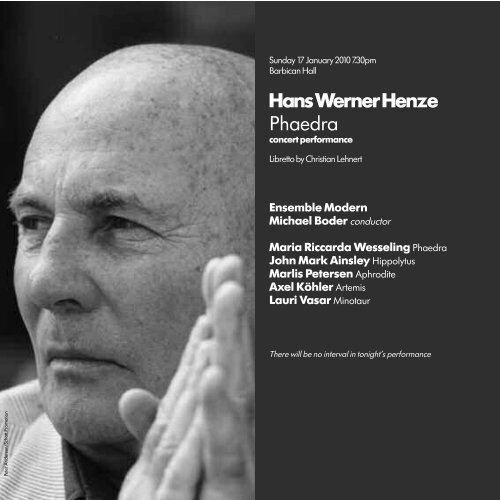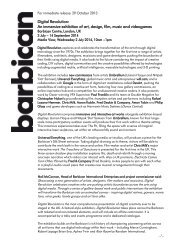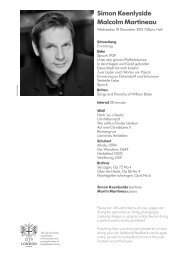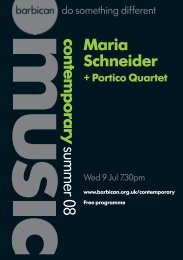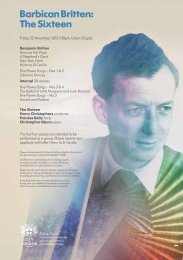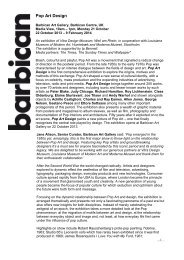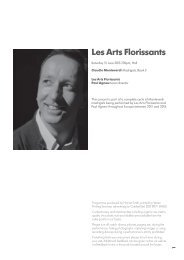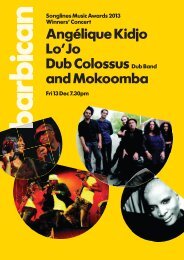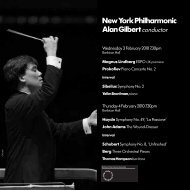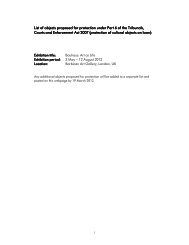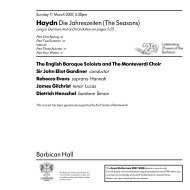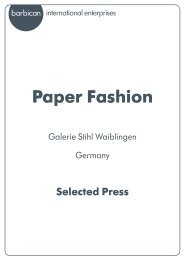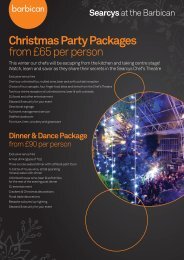Hans Werner Henze Phaedra - Barbican
Hans Werner Henze Phaedra - Barbican
Hans Werner Henze Phaedra - Barbican
Create successful ePaper yourself
Turn your PDF publications into a flip-book with our unique Google optimized e-Paper software.
Peter Andersen/Schott Promotion<br />
Sunday 17 January 2010 7.30pm<br />
<strong>Barbican</strong> Hall<br />
<strong>Hans</strong> <strong>Werner</strong> <strong>Henze</strong><br />
<strong>Phaedra</strong><br />
concert performance<br />
Libretto by Christian Lehnert<br />
Ensemble Modern<br />
Michael Boder conductor<br />
Maria Riccarda Wesseling <strong>Phaedra</strong><br />
John Mark Ainsley Hippolytus<br />
Marlis Petersen Aphrodite<br />
Axel Köhler Artemis<br />
Lauri Vasar Minotaur<br />
There will be no interval in tonight’s performance
introduction<br />
<strong>Hans</strong> <strong>Werner</strong> <strong>Henze</strong>: a humanitarian life<br />
You can read the history of 20th and 21st century history – not just musical history – through the story of 83-year-old <strong>Hans</strong><br />
<strong>Werner</strong> <strong>Henze</strong>’s life. Born in Gütersloh in Westphalia in 1926, the young <strong>Henze</strong> was forced into the Hitler Youth by a<br />
combination of parental and political pressure; he went on to fight for his country, but – after the war – repudiated all that the<br />
Germany of his youth had represented. Politically, <strong>Henze</strong>’s left-wing sympathies would take him to Cuba in the 1960s, and<br />
produce works of heartfelt humanist empathy, such as El Cimarrón and the gigantic song-compilation of the 1970s, Voices.<br />
He marked himself as an outsider from his homeland by moving to Italy, first to Ischia and then to the hills above Rome, where<br />
he still makes his home.<br />
And <strong>Henze</strong>’s music made him an outsider, too. His operas – a series of 14 full-scale works so far, beginning with Boulevard<br />
Solitude (1952) up to the latest, <strong>Phaedra</strong>, premiered 55 years later in 2007 – antagonised the avant-garde, including <strong>Henze</strong>’s<br />
contemporaries, Pierre Boulez and Luigi Nono. At mid-century, <strong>Henze</strong>’s music and his whole artistic ethos, his commitment to<br />
the expression of emotional, poetic and human truths as the ideal to which music ought to aspire, was heard as too<br />
conservative by the denizens of Darmstadt, the avant-garde’s crucible in Germany – despite the fact that no composer did<br />
more to contribute to Cuba’s post-revolutionary society, for which <strong>Henze</strong> wrote his Sixth Symphony in 1969. But <strong>Henze</strong> was<br />
never narrowly committed to political ideologies for their own sake, and in the decades after the end of the illusion of world<br />
revolution, his operas and his instrumental music have written out his unchanging human concerns with an unflinching<br />
honesty, empathy and emotional generosity. You can hear those qualities in works such as his Requiem for solo trumpet<br />
and ensemble, composed in the early 1990s in memory of the London Sinfonietta’s musical director, Michael Vyner; or the<br />
Ninth Symphony from 1997, which explores <strong>Henze</strong>’s complex relationship with his homeland in a choral symphony for the<br />
end of the 20th century; or in his Elogium Musicum, written in tribute to his partner of 40 years, Fausto Moroni, who died<br />
suddenly in 2007.<br />
At the start of the new century, <strong>Henze</strong>’s refusal to bend to any dogma apart from the demands of his own creative impulse,<br />
the communicativeness and fluency of his idiom, and, above all, the necessity he feels to create, through his music, ‘a sense<br />
of security in a state of utter helplessness’, are more valuable than ever.<br />
Introduction © Tom Service
<strong>Hans</strong> <strong>Werner</strong> <strong>Henze</strong> (born 1926)<br />
<strong>Phaedra</strong> (2003–7)<br />
An opera in two acts<br />
Libretto by Christian Lehnert<br />
<strong>Hans</strong> <strong>Werner</strong> <strong>Henze</strong> didn’t know it when he started work on<br />
his latest opera, <strong>Phaedra</strong>, a few years ago, but this was to be<br />
a work that inscribed his life in his music in an uncanny,<br />
spookily prescient way. For the past 43 years, <strong>Henze</strong> has<br />
lived in Marino in the Castelli Romani, nestled in the hills<br />
above Rome. It’s a place that is thick with history and myth.<br />
Every day, <strong>Henze</strong> – who’s now 83, his features and physique<br />
marked by time, but who still radiates a disarmingly youthful<br />
blue-eyed twinkle – looks out into the gnarled infinity of his<br />
olive grove. These 80 trees provide him with 200 litres of<br />
delicious, peppery oil every year, and they were planted<br />
around 500 years ago. If he ventures just a little further into<br />
the verdant abundance of the hills behind his home, he will<br />
find Lake Nemi, a place of enormous importance in the<br />
ancient world, where there was an important shrine to<br />
Diana, goddess of the hunt, and where Emperor Caligula<br />
built a fleet of gigantic pleasure boats. The lake has become<br />
part of more modern mythology, too: Turner painted a view<br />
of Nemi, and the lake and its shrine inspired James Frazer’s<br />
epoch-making study of ancient myth, The Golden Bough.<br />
Lake Nemi is also the setting for the Second Act of <strong>Henze</strong>’s<br />
<strong>Phaedra</strong>. ‘Reading The Golden Bough, I discovered I’m<br />
living in the actual territory he describes’, <strong>Henze</strong> told me<br />
at his home at the end of last year. The First Act of the<br />
opera tells the story of <strong>Phaedra</strong>’s love for her stepson,<br />
Hippolytus, and his murder by Theseus. But the Second Act,<br />
in Christian Lehnert’s libretto, stages Hippolytus’s afterlife by<br />
the shores of Lake Nemi, and is the backdrop for his<br />
programme note<br />
transformation into a mystical bird-creature and the King<br />
of the Forest.<br />
But it’s not just the mythical location of the Second Act of<br />
<strong>Phaedra</strong> that places the piece within <strong>Henze</strong>’s life-story.<br />
<strong>Henze</strong> had completed the bulk of the First Act of the opera in<br />
2005 when he was struck by a mysterious illness that brought<br />
him close to death – so close, in fact, that he was visited<br />
during a two-month-long near-coma by friends from all over<br />
the world, who came to say their farewells. ‘I stopped eating,<br />
and I stopped speaking, and just lay flat in my bed’, he told<br />
me. ‘People thought the moment had come. And they came<br />
from everywhere, all over the world, from New York, for a<br />
funeral.’ He laughs, gently but sardonically. Was he<br />
completely unconscious? He nods his head. ‘But the<br />
moments when people came to say goodbye, I sometimes<br />
felt them around me – and saw them, sort of. And then one<br />
morning, I just stood up. Fausto [Moroni, <strong>Henze</strong>’s partner for<br />
40 years] was amazed. So was I. And then I started writing<br />
again.’<br />
<strong>Henze</strong> started work on Act 2 of <strong>Phaedra</strong> – the story of<br />
Hippolytus’s own return from the world of the dead. This new<br />
Hippolytus doesn’t recognise himself, he doesn’t understand<br />
his place in the world, or the relationship between past and<br />
present. After his coma, <strong>Henze</strong>’s own world had changed.<br />
And he told me that his experiences, his feelings about the<br />
transformed world he awoke to, are written into the Second<br />
Act of <strong>Phaedra</strong>. Hearing the whole, 75-minute opera for the<br />
3
programme note<br />
first time in Berlin in 2007 (performed by many of tonight’s<br />
musicians – Ensemble Modern, conductor Michael Boder,<br />
and some of the same singers, including John Mark Ainsley<br />
as Hippolytus), <strong>Henze</strong> was shocked at the power of his<br />
Second Act. ‘I had a very talented fellow called Francesco<br />
Antonioni who helped me when I was writing the first part’,<br />
<strong>Henze</strong> says (Antonioni also made the opera’s electroacoustic<br />
‘bruitage’, a tape-track that you’ll hear interspersed<br />
throughout the score), ‘and he became very important for<br />
the second. In rehearsals, he said, “Maestro, the first part<br />
went quite well, but God knows how the second part will turn<br />
out.” And in performance it turned out to be much more<br />
telling and strong than the first one. I don’t know myself why<br />
it is so successful – but it is.’<br />
Yet <strong>Henze</strong> has a clear idea of how his music has changed in<br />
recent years – and offers a clue as to why his score for<br />
<strong>Phaedra</strong> is so astonishingly effective. ‘I think if it has<br />
changed, it’s changed for the better. Only the most<br />
necessary notes appear on the paper, the not-so-necessary<br />
are left out.’ You can hear the effects of this musical<br />
distillation in every bar. <strong>Henze</strong> describes the piece as a<br />
‘concert opera’, a formulation that hints at the soloistic roles<br />
played by the instrumentalists as well as the singers.<br />
Composed for the new-music virtuosi of Frankfurt’s<br />
Ensemble Modern, and scored for 23 players, <strong>Phaedra</strong>’s<br />
music has a diaphanous depth. <strong>Henze</strong> uses the colouristic<br />
power of his woodwind- and brass-heavy ensemble (14 of<br />
them, who play alongside a harp, celesta, and piano, two<br />
4<br />
percussionists, and just four strings) to create the mythic<br />
earthquakes and storms that perforate the work’s drama.<br />
But more often than not, the ensemble is pared down to a<br />
handful of individual lines, filaments of sound that weave a<br />
resonant magic around <strong>Henze</strong>’s vocal lines, from <strong>Phaedra</strong>’s<br />
music, by turns lovelorn and vengeful, to Hippolytus’s<br />
existential questioning in the Second Act, or the voluptuous<br />
part that <strong>Henze</strong> composes for the goddess Artemis (the<br />
Greek name for Diana), cast as a countertenor.<br />
At the end of the Second Act, the Minotaur leads the cast in a<br />
life-affirming hymn, music that shimmers with ethereal<br />
energy in <strong>Henze</strong>’s orchestration: ‘We are all born naked. We<br />
press towards mortality and dance’. That’s a motto that<br />
stands for <strong>Henze</strong>’s continuing creativity after coming so close<br />
to the end of his life, the end of his dance. Shortly after<br />
<strong>Henze</strong> had finished <strong>Phaedra</strong>, his longstanding partner,<br />
Fausto Moroni, died suddenly. <strong>Henze</strong>’s world changed<br />
again. ‘The loss that I’ve suffered is very strong, and it makes<br />
my whole life, the whole world, seem quite different from<br />
what I thought it was.’ Like Hippolytus at the end of his<br />
opera, <strong>Henze</strong> lives in a world transfigured by death and<br />
near-death experiences. But he has wrested his creativity<br />
from the crucible of these traumas. <strong>Phaedra</strong> is his latest<br />
opera, but not the last. In <strong>Henze</strong>’s study, upstairs in his house<br />
in Marino, are the sketches for a new opera that will be<br />
premiered later this year: <strong>Henze</strong>’s dance goes on.<br />
Programme note © Tom Service
Synopsis<br />
Act 1<br />
Morning<br />
I The Labyrinth<br />
Echoes sound through the ruins of the labyrinth, in the depths of<br />
which Theseus conquered the Minotaur, and become voices in a<br />
new story: <strong>Phaedra</strong> and Hippolytus.<br />
II At the Edge of the Wood<br />
Hippolytus has set off for the hunt. <strong>Phaedra</strong> wanders through the<br />
first light of dawn. She is driven by desire and shame, by love for<br />
her stepson Hippolytus and self-loathing. She seeks her death. As<br />
she tries to slit her wrists with a shard of glass, the goddess<br />
Aphrodite holds her back. Aphrodite, herself in love with<br />
Hippolytus, is offended by his exclusive worship of Artemis,<br />
goddess of the hunt, and wants to take revenge.<br />
III Thicket<br />
In her idle wanderings over boulders and through thickets,<br />
<strong>Phaedra</strong>, accompanied by Aphrodite, happens upon the sleeping<br />
Hippolytus. She kneels down before him and sings of her love.<br />
Hippolytus awakens. <strong>Phaedra</strong> confesses her feelings frankly to<br />
him. Artemis steps out of the wood to warn Hippolytus. Hippolytus,<br />
outraged by his stepmother, brutally pushes her away. <strong>Phaedra</strong>’s<br />
feelings change suddenly to hate. Aphrodite and <strong>Phaedra</strong> unite in<br />
their rage. Hippolytus, however, only hears the call of Artemis and<br />
turns away unmoved. <strong>Phaedra</strong> grabs hold of Hippolytus’s knife<br />
and makes another attempt to slit her wrists. Aphrodite once again<br />
holds her back.<br />
synopsis<br />
IV The Snare<br />
<strong>Phaedra</strong> lies upon her bed in the palace and writes Theseus a<br />
letter slandering her stepson. She claims that Hippolytus raped her.<br />
The unsuspecting Hippolytus returns from the hunt.<br />
V The Death of Hippolytus<br />
Artemis enters the palace. She narrates: Theseus believed<br />
<strong>Phaedra</strong>’s letter. He determined to kill his son and asked Poseidon<br />
for help. As Hippolytus drove along the coast in his chariot,<br />
Poseidon allowed the resurrected Minotaur to rise out of the sea.<br />
The horses shied and dragged Hippolytus over the rocks. While<br />
Artemis sings, the mortally wounded Hippolytus staggers toward<br />
her and collapses. The slam of a trapdoor is heard. <strong>Phaedra</strong><br />
hangs from a rope. The Minotaur dances in the background.<br />
5
synopsis<br />
Act 2<br />
Evening<br />
I Do you remember who you were?<br />
Artemis, goddess of the hunt, has brought Hippolytus to her grove<br />
in Nemi in Italy. With an assistant, she works on Hippolytus’s body<br />
to bring him back to life. Once they succeed, she locks him up in a<br />
cage and gives him a new name: Virbius. <strong>Phaedra</strong> rises from the<br />
Underworld as a bird-being and mocks Hippolytus as the work<br />
and pet of the goddess.<br />
II When do the dead approach you, Hippolytus?<br />
A storm approaches the grove in Nemi. Aphrodite appears in a<br />
ring of light and demands the right of the gods: Hippolytus<br />
belongs in the Underworld. <strong>Phaedra</strong> and Aphrodite circle<br />
Hippolytus’s cage in order to seize him. They sing of death, and<br />
both lure Hippolytus like an animal. Artemis catches Hippolytus in<br />
a net and hides him in a safe cave.<br />
6<br />
III In the Mirror<br />
Distraught, Hippolytus crouches before a spring in the cave. He<br />
examines his reflection in the water. He does not know who he is.<br />
He dreams of a faraway garden. <strong>Phaedra</strong> strolls toward him like a<br />
barmaid to lure him into the Underworld. Hippolytus, frightened<br />
and confused, pushes <strong>Phaedra</strong> away and struggles out of the<br />
cave. An earthquake shakes the cave.<br />
IV King of the Forest<br />
Hippolytus has risen as King of the Forest. He wanders through the<br />
grove in Nemi. What has happened and will happen, becomes<br />
blurred in a dance.<br />
Synopsis © Christian Lehnert
Opern-Agentur Tamara Herzl<br />
About tonight’s performers<br />
Michael Boder conductor<br />
Michael Boder studied at the<br />
Hamburg College of Music before<br />
moving to Florence, where he was an<br />
assistant to Riccardo Muti and Zubin<br />
Mehta. He worked with Michael<br />
Gielen at Frankfurt Opera (1984–8),<br />
where he took on his first production.<br />
He became principal conductor of<br />
Basle Opera before he was 30 and<br />
has worked at the opera houses of<br />
Cologne, Hamburg, Stuttgart, Munich,<br />
Berlin, Dresden and Zurich, the<br />
National Theatre in Tokyo, San<br />
Francisco Opera and at the Royal<br />
Opera House, Covent Garden, among<br />
others.<br />
His repertoire ranges from Mozart to<br />
contemporary music, and he has given<br />
the premieres of Penderecki’s Ubu Roi<br />
at the Munich Opera Festival, Pascal<br />
Dusapin’s Fist, as well as Aribert<br />
Reimann’s Das Schloss at the Deutsche<br />
Opera Berlin, and the premiere of<br />
tonight’s piece in Berlin in 2007.<br />
Michael Boder made his debut at the<br />
Vienna State Opera in 1995 with<br />
Berg’s Wozzeck, followed by a new<br />
production of Lulu. He has also given<br />
the Austrian stage premiere of<br />
Schoenberg’s Die Jakobsleiter,<br />
together with Puccini’s Gianni Schicchi;<br />
the premiere of Der Riese vom<br />
Steinfeld by Friedrich Cerha,<br />
commissioned by the Vienna State<br />
Opera, as well as revivals of Die<br />
Meistersinger von Nürnberg and<br />
Enescu’s Oedipe.<br />
He is also very active in the concert<br />
hall, directing such orchestras as the<br />
Leipzig Gewandhaus, Bamberg<br />
Symphony Orchestra, the Berlin,<br />
Czech, Hamburg and Oslo<br />
Philharmonic orchestras, the<br />
Gulbenkian Orchestra and the NHK<br />
Symphony Orchestra in Tokyo.<br />
Last season Michael Boder became<br />
principal conductor of the Gran Teatre<br />
del Liceu in Barcelona.<br />
about the performers<br />
John Mark Ainsley tenor<br />
John Mark Ainsley was born in<br />
Cheshire, began his musical training in<br />
Oxford and continues to study in<br />
London with Diane Forlano. A highly<br />
versatile concert singer, his<br />
international engagements include<br />
appearances with the London, Boston<br />
and San Francisco Symphony<br />
orchestras, and the Berlin, Vienna and<br />
New York Philharmonic orchestras<br />
under, among others, Bernard Haitink,<br />
Mstislav Rostropovich, Sir Colin Davis<br />
and Sir Simon Rattle, as well as with<br />
early music ensembles such as Le<br />
Concert d’Astrée under Emmanuelle<br />
Haïm and Les Musiciens du Louvre<br />
under Marc Minkowski.<br />
On the operatic stage he has sung Don<br />
Ottavio at Glyndebourne under Rattle,<br />
at Aix-en-Provence under Claudio<br />
Abbado, and for his Royal Opera<br />
7
about the performers<br />
debut under Sir Charles Mackerras. At<br />
the Salzburg Festival he created the<br />
role of The Demon in the world<br />
premiere of <strong>Hans</strong> <strong>Werner</strong> <strong>Henze</strong>’s<br />
L’Upupa und der Triumph der<br />
Sohnesliebe, a role to which he<br />
returned in Dresden last year. Other<br />
operatic appearances include the titleroles<br />
in Handel’s Samson for<br />
Netherlands Opera and in Idomeneo<br />
and Orfeo at the Munich Festival,<br />
Captain Vere in Billy Budd in Frankfurt,<br />
and Skuratov in From the House of the<br />
Dead at the Amsterdam, Vienna and<br />
Aix-en-Provence festivals. Recent and<br />
future engagements include Billy Budd<br />
at Glyndebourne and his debut at La<br />
Scala, Milan, in From the House of the<br />
Dead.<br />
John Mark Ainsley’s extensive<br />
discography ranges from Bach and<br />
Handel to Britten and Brigadoon, as<br />
well as including a series of recital<br />
discs of Schubert, Mozart, Purcell,<br />
Grainger, Warlock and Quilter. His<br />
recording of Vaughan Williams’s On<br />
Wenlock Edge was nominated for a<br />
Gramophone Award, and he was the<br />
winner of the Royal Philharmonic<br />
Society Singer Award in 2007.<br />
8<br />
Carsten Nüssler<br />
Axel Köhler countertenor<br />
Countertenor and director Axel Köhler<br />
was born in Schwarzenberg and<br />
trained initially as a baritone, before<br />
switching to countertenor while<br />
studying in Berlin and London. He<br />
made his countertenor debut as<br />
Eustazio (Handel’s Rinaldo) at the<br />
Handel Festival in Halle. Since then he<br />
has established a reputation as a<br />
Handelian, including title-roles in<br />
Sosarme, Giulio Cesare, Orlando,<br />
Tolomeo and Tamerlano, making his<br />
American debut in the latter role in<br />
1990.<br />
Other repertoire ranges from<br />
Monteverdi’s The Coronation of<br />
Poppea and Orfeo and Telemann’s<br />
Orfeo to Die Fledermaus and The<br />
Rake’s Progress. Contemporary music<br />
also forms an important strand in Axel<br />
Köhler’s career, including Alexander<br />
Goehr’s Arianna, the title-role in<br />
Siegfried Matthus’s Farinelli, Detlev<br />
Glanert’s Scherz, Satire, Ironie und<br />
tiefere Bedeutung, <strong>Hans</strong> <strong>Werner</strong><br />
<strong>Henze</strong>’s L’Upupa und der Triumph der<br />
Sohnesliebe and the title-role in Cantor<br />
by Ingomar Grünauer.<br />
He participated in the premiere of<br />
<strong>Henze</strong>’s <strong>Phaedra</strong> at the Berlin State<br />
Opera, creating the role he sings this<br />
evening, and which he subsequently<br />
performed in Brussels, Vienna,<br />
Frankfurt and Berlin in 2008. The same<br />
year saw productions of Ariodante in<br />
Halle and Hasse’s Cleofide in<br />
Dresden.<br />
Since 2000 Axel Köhler has also been<br />
active as a stage director, with<br />
productions of The Coronation of<br />
Poppea, Teseo, Amadigi, Admeto,<br />
Don Giovanni, The Magic Flute,<br />
Boieldieu’s La dame blanche, Lehár’s<br />
Das Land des Lächelns, Britten’s A<br />
Midsummer Night’s Dream and Paul<br />
Abraham’s The Flower of Hawaii.<br />
At the start of this season he became<br />
the artistic manager of Halle Opera.
Marlis Petersen soprano<br />
The soprano Marlis Petersen studied at<br />
the Stuttgart Academy of Music, going<br />
on to win several singing competitions.<br />
As a member of the Nuremberg State<br />
Theatre her roles included Aennchen<br />
(Der Freischütz), Blonde (Die<br />
Entführung aus dem Serail), Adele (Die<br />
Fledermaus), Rosina (The Barber of<br />
Seville), the title-role in Lulu, and<br />
Queen of the Night (The Magic Flute).<br />
She has also appeared as a guest<br />
artist at opera houses including Berlin,<br />
Bremen, Düsseldorf, Hanover,<br />
Karlsruhe, Munich, Frankfurt and<br />
Wiesbaden.<br />
Marlis Petersen made her debut at the<br />
Vienna State Opera as Lulu, singing<br />
the same role at the Hamburg State<br />
Opera and in Athens. Other highlights<br />
have included Zerbinetta (Ariadne auf<br />
Naxos) at the Royal Opera, Covent<br />
Garden, Oscar (Un ballo in maschera)<br />
at the Bregenz Festival, Nightingale<br />
(Walter Braunfels’s Die Vögel) in<br />
Geneva, Adele at the Opéra Bastille,<br />
the Metropolitan Opera, New York,<br />
and the Chicago Lyric Opera, and<br />
Elisa (Il re pastore) at the Salzburg<br />
Festival.<br />
In concert she regularly works with<br />
Helmuth Rilling and René Jacobs,<br />
with whom she has toured Europe and<br />
the USA.<br />
Recent and forthcoming engagements<br />
include concerts with the Leipzig<br />
Gewandhaus Orchestra and the<br />
Boston Symphony Orchestra, a<br />
European tour singing Brahms Lieder,<br />
the world premiere of Manfred<br />
Trojahn’s La grande magia at the<br />
Dresden Semperoper, Lulu for<br />
Chicago Lyric Opera, Susanna (The<br />
Marriage of Figaro) in Los Angeles,<br />
Natalie (<strong>Henze</strong>’s Der Prinz von<br />
Homburg) at the Theater an der Wien<br />
and guest appearances at the Munich<br />
State Opera, Vienna State Opera and<br />
the Metropolitan Opera, as well as at<br />
the Aix-en-Provence Festival.<br />
about the performers<br />
Lauri Vasar baritone<br />
Estonian-born Lauri Vasar studied at<br />
the Academy of Music in Tallinn and<br />
made his debut with the Estonian<br />
National Opera in 1999, subsequently<br />
continuing his studies at the Salzburg<br />
Mozarteum, making his debut there<br />
singing Ravel’s Don Quichotte à<br />
Dulcinée.<br />
The following year he made his debut<br />
in the USA, with recitals of Mozart,<br />
Richard Strauss and Rachmaninov<br />
and in Beethoven’s Ninth Symphony<br />
in Chicago.<br />
Since then his roles have included Peter<br />
(<strong>Hans</strong>el and Gretel), Dandini (La<br />
Cenerentola) and roles in Richard<br />
Strauss’s Capriccio, Orff’s Carmina<br />
burana, Egon Wellesz’s The<br />
Bacchantes and Verdi’s Don Carlos.<br />
From 2002 to 2006 he was a member<br />
9
about the performers<br />
of Linz Opera, taking on such roles as<br />
Papageno, Guglielmo, Belcore (L’elisir<br />
d’amore), Pantalone (The Love for<br />
Three Oranges), Posa (Don Carlos),<br />
Valentine (Faust), Falke (Die<br />
Fledermaus) and Lescaut (Manon<br />
Lescaut), among others.<br />
He made his debut in the music of<br />
<strong>Henze</strong> in the role of Al Kasim in<br />
L’Upupa und der Triumph der<br />
Sohnesliebe at the Teatro Real in<br />
Madrid, a role he reprised in Lyon<br />
and Geneva and in a concert version<br />
in Tokyo.<br />
Most recently, he has sung in Peter<br />
Eötvös’s Three Sisters for the Hamburg<br />
State Opera, Poulenc’s Dialogues des<br />
Carmélites for the Teatro Real Madrid<br />
and Tannhäuser in Hanover, and has<br />
also taken the title-roles in<br />
Monteverdi’s Orfeo and<br />
Dallapiccola’s Il prigioniero.<br />
10<br />
Emilio Brizzi<br />
Maria Riccarda Wesseling<br />
mezzo-soprano<br />
The Swiss mezzo-soprano Maria<br />
Riccarda Wesseling sprang to<br />
international prominence when she<br />
replaced Susan Graham in the titlerole<br />
of Gluck’s Iphigénie en Tauride<br />
for Opéra de Paris in 2006. This was<br />
followed by acclaim for her creation of<br />
the title-role in tonight’s work at its<br />
2007 premiere.<br />
Other roles include Gluck’s<br />
Eurydice, Carmen, Octavian (Der<br />
Rosenkavalier), Idamante (Idomeneo),<br />
Sextus (La clemenza di Tito), the titlerole<br />
in La Cenerentola, Rosina (The<br />
Barber of Seville), Fenena (Nabucco),<br />
Marguerite (Berlioz’s La damnation de<br />
Faust), Hedwig (Offenbach’s Die<br />
Rheinnixen), Giulietta (Les contes<br />
d’Hoffmann), Métella (La vie<br />
parisienne), Bianca (Zemlinsky’s Eine<br />
florentinische Tragödie), Purcell’s Dido<br />
and Handel roles such as Rodrigo,<br />
Rinaldo, Amadigi, Giulio Cesare and<br />
Sesto. Her contemporary roles include<br />
Kassandra (Aribert Reimann’s<br />
Troades), Pilgrim (Kaija Saariaho’s<br />
L’amour de loin) and La Malaspina<br />
(Sciarrino’s Luci mie traditrici).<br />
Works performed in concert include<br />
Berlioz’s Les nuits d’été and La mort de<br />
Cléopâtre, Ravel’s Shéhérazade,<br />
Respighi’s Il tramonto, Chausson’s<br />
Poème de l’amour et de la mer,<br />
Wagner’s Wesendonck Lieder and<br />
orchestral songs by Schoenberg,<br />
Zemlinsky, Berg, Mahler and Richard<br />
Strauss, which she has also recorded.<br />
Recently Maria Riccarda Wesseling<br />
has sung at the Théâtre des Champs-<br />
Élysées, Opéra National de Paris,<br />
Opéra National de Lyon, La Monnaie,<br />
Brussels, Geneva’s Grand Théâtre,<br />
Finnish National Opera, Staatsoper<br />
Berlin, Semperoper Dresden, Zurich<br />
Tonhalle, and the Amsterdam<br />
Concertgebouw, as well as festivals in<br />
Montpellier, Beaune, Bremen, Halle,<br />
Schwetzingen and Zurich.<br />
Her recordings have ranged from<br />
Handel (including the title-roles in<br />
Amadigi and Rodrigo) to Lieder and<br />
Wagner, plus DVDs of works by
Handel, Monteverdi and Offenbach.<br />
Forthcoming engagements include<br />
Bach’s St John Passion under<br />
Riccardo Chailly.<br />
Ensemble Modern<br />
Founded in 1980 and situated in<br />
Frankfurt am Main since 1985, the<br />
Ensemble Modern is one of the world’s<br />
leading ensembles specialising in new<br />
music. Currently, Ensemble Modern<br />
consists of 19 soloists from Argentina,<br />
Bulgaria, Germany, India, Israel,<br />
Japan, Poland and Switzerland, all of<br />
whom contribute to the ensemble’s rich<br />
cultural background.<br />
Ensemble Modern is renowned for its<br />
unique working and organisational<br />
form: all the members are responsible<br />
for jointly selecting and dealing with<br />
projects, co-productions and financial<br />
matters. Its highly distinctive<br />
programming includes music theatre,<br />
dance and video projects, chamber<br />
music, ensemble and orchestral<br />
concerts.<br />
In past years, Ensemble Modern has<br />
gone on tour to Russia, South America,<br />
Japan, Australia, Africa, India, Korea,<br />
Taiwan and America. It regularly<br />
performs at leading festivals and<br />
outstanding venues, such as the Lincoln<br />
Center Festival in New York, Festival<br />
d’Automne à Paris, Holland Festival in<br />
Amsterdam, Lucerne Festival,<br />
Klangspuren in Schwaz, Salzburg<br />
Festival, MaerzMusik / Berliner<br />
Festspiele, Alte Oper Frankfurt,<br />
Oper Frankfurt, Kölner Philharmonie,<br />
Konzerthaus Berlin, Philharmonie<br />
Essen and the Festspielhaus Baden-<br />
Baden.<br />
Ensemble Modern gives around 100<br />
concerts each year, in which it strives<br />
to achieve the highest degree of<br />
authenticity by working closely with the<br />
composers themselves. The musicians<br />
about the performers<br />
rehearse an average of 70 new works<br />
every year, 20 of which are world<br />
premieres.<br />
In 2003, the German Federal Cultural<br />
Foundation nominated Ensemble<br />
Modern as one of Germany’s<br />
‘beacons’ of contemporary culture. As<br />
a result of this honour, Ensemble<br />
Modern receives a funding package<br />
from the German Federal Cultural<br />
Foundation that supports three major<br />
strands of the group – the Ensemble<br />
Modern Orchestra, the International<br />
Ensemble Modern Academy and the<br />
ensemble’s special projects.<br />
Ensemble Modern is funded by the German<br />
Federal Cultural Foundation, the City of<br />
Frankfurt, the German Ensemble Academy<br />
Assoc., the state of Hesse, the GEMA<br />
Foundation and the GVL.<br />
hr2-kultur is the cultural affairs partner of<br />
Ensemble Modern.<br />
11
about the performers<br />
Ensemble Modern<br />
Flute/piccolo<br />
Dietmar Wiesner<br />
Flute/piccolo/<br />
alto flute<br />
Rüdiger Jacobsen<br />
Oboe<br />
Nick Deutsch<br />
Oboe/cor anglais<br />
Antje Thierbach<br />
Clarinet/bass<br />
clarinet/saxophone<br />
Nina Janssen<br />
Clarinet/bass<br />
clarinet/contrabass<br />
clarinet/saxophone<br />
Udo Grimm<br />
Present<br />
Voices<br />
UK premieres of operas<br />
by three of today’s most<br />
distinctive voices<br />
Opera is constantly diversifying<br />
and the debate surrounding<br />
the definition of the word<br />
opera is fiercer now than it<br />
has even been. Present Voices<br />
seeks to present UK premieres<br />
of contemporary operas by a<br />
variety of different composers<br />
from around the world.<br />
Bassoon<br />
Johannes Schwarz<br />
Bassoon/<br />
contrabassoon<br />
Lucas Rössner<br />
Horn/Wagner tuba<br />
Saar Berger<br />
Zora Slokar<br />
Trumpet<br />
Sava Stoianov<br />
Valentín Garvie<br />
Trombone/alto<br />
trombone<br />
Uwe Dierksen<br />
Trombone/tenor<br />
trombone/bass<br />
trombone<br />
Michael Büttler<br />
Piano<br />
Ueli Wiget<br />
Celesta/sampler<br />
Hermann Kretzschmar<br />
Percussion<br />
Rumi Ogawa<br />
Rainer Römer<br />
do something different<br />
Harp<br />
Gunnhildur Einarsdottir<br />
Sun 17 Jan 2010 7.30pm<br />
<strong>Phaedra</strong><br />
<strong>Hans</strong><strong>Werner</strong><strong>Henze</strong>’slatest<br />
operarecountsthetaleof<br />
this famous Greek myth. With<br />
soloists including John Mark<br />
Ainsley and Maria Riccarda<br />
Wesseling.<br />
Violin<br />
Rafal Zambrzycki-<br />
Payne<br />
Viola<br />
Megumi Kasakawa<br />
Cello<br />
Eva Böcker<br />
Double bass<br />
Axel Bouchaux<br />
The musicians of Ensemble<br />
Modern would like to thank<br />
the Aventis Foundation for<br />
financing a seat in the<br />
Ensemble.<br />
Fri 26 Mar 2010 7.30pm<br />
Angels in America<br />
Peter Eötvös’ operatic take on<br />
Tony Kushner’s Pulitzer prizewinning<br />
play.<br />
Concert performances | Tickets from £9 | www.barbican.org.uk<br />
Sat 15 May 2010 7.30pm<br />
After Life<br />
Which one memory would you<br />
choose to take to eternity? Asks<br />
Michel van der Aa’s After Life.<br />
With soloists including Claron<br />
McFadden and Roderick<br />
Williams.


